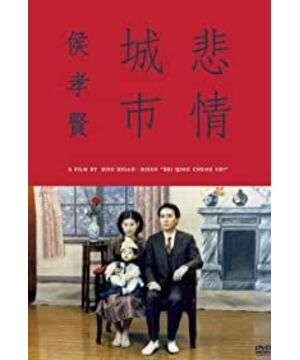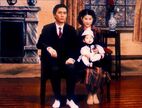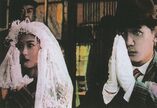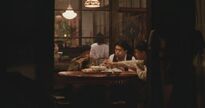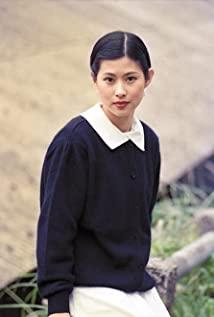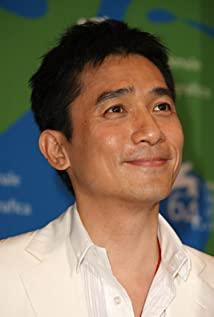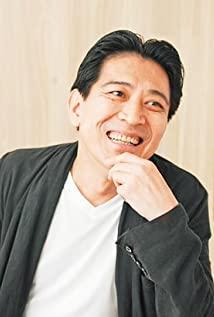Hou Hsiao-hsien's "City of Sorrows" gives us a convincing example. Although the experience of the family is too tragic, in that era, this is not a deliberate exaggeration without basis.
The movie begins with the surrender of the Japanese emperor. The picture shows Lin Wenxiong anxiously waiting for a woman to give birth, while the background sound is Japan's declaration of surrender. This overlap shows that during the Japanese rule, the people of Taiwan were in dire straits and suffering. When the child was born and the cry came, it was also the time of Taiwan's liberation. The two happy events converged at one point, revealing people's yearning for a better future, but this is not the case.
The four brothers of Lin Wenxiong's family, Wenxiong is the eldest, they manage the family's warehouse, and they live a decent life. Excited, Si Wenqing fell from a tree at the age of eight and became deaf. During the Japanese enslavement period, the family was out of shape, and who knew that the more tragic things were still to come.
The second child was missing, perhaps dead, but the family would rather believe he was alive. Wenliang recovered his spirits after being recuperated in the hospital, but met some strange people. Others stared at his family's six boats and wanted to ship some private goods. Who knew that Wenxiong found out, and this matter also happened. put it on hold. Wenxiong is a rough man, and it is more appropriate for Chen Songyong, who was born in the underworld, to play the role. He has a natural gangster temperament, and because of this temperament matches the role, he won the Taiwan Golden Horse Best Actor, which is not controversial. Wenxiong is innocent and does not associate with the underworld, which is related to his father's influence. His father is an interesting person in this film. This is the only thing that makes people feel interesting under the gloomy atmosphere of the whole film. In the film, he emphasizes that he is a hooligan twice. Yes, once when the soldiers arrested Wenliang, he said his son was a traitor, and he made a strong rebuttal. This rebuttal was very exciting, leaving the arresters speechless, fully demonstrating the untenable behavior of these people. Ordinary people are inexplicably persecuted in this way. Wenliang was arrested, and Wenxiong had to contact the underworld. This was forced by the situation, not a compromise, but Wenliang who returned home has become a fool. It's not too bad when things got here, but in order to vent Wenliang's anger, Ajia took the initiative to cause trouble and took Wenxiong's life. Dead dead, crazy crazy, missing missing, deaf and deaf, if this is not the limit of sadness, God has been unable to define sadness.
Grief is like a plague, spreading ruthlessly in a special era. If you have to take everything away, you will never let it go. Wen Qing belongs to the literary part in this film. It seems that the beating and killing of rough people has nothing to do with him, and because he cannot hear, he is less disturbed, and is virtually isolated from his family and the whole chaotic society. isolate. Wenqing is a photographer, and Zhang Ji's "Night Moor on the Maple Bridge" hangs on the wall, which undoubtedly conveys the loneliness of Wenqing's heart. Wenqing is not without friends, but Kuanrong is his best friend. It's just the heart of a deaf person. Some closed. Because of Kuan Rong, Wen Qing met Kuan Mei, the narrator of the film's narration, and the two developed a relationship between paper and pen.
Kuan Rong represented the youth of that era. He was full of enthusiasm and dared to unite people with lofty ideals to challenge the chaotic government. They were dedicated to the people, proceeding from the interests of the people, regardless of the consequences, and only for freedom. Kuan Rong represented intellectuals, thoughtful, intelligent, and poetic. He wore round-frame glasses, which reminded people of Xu Zhimo. Xu Zhimo also participated in the May Fourth Movement and worked hard for revolutionary education. Xu Zhimo is a poet, but who is not a poet among the young people born in that era? Kuan Rong and Shizuko's brother are good friends, and Shizuko's brother is not a young man with flesh and blood. They are both ruthless and ruthless because of the war. Shizuko's brother died in the war, and Shizuko will be sent back to the country after the war. Come and go is beautiful. Xu Zhimo's poems may be just right for them, Sayanara.
Kuan Rong and his friends worry about national affairs all day long. They look forward to a beautiful future, but the reality weighs them down. There were two chats in the film. One was a few days after the war. Everyone was in a good mood. Wu Nianzhen told a joke, saying that it doesn’t matter if the sun flag is hung up, but the flag is difficult. Some people don’t know whether the sun is up or down. So there was a joke, some people thought that life should be warm, but Kuanrong pointed out the worries. This kind of worry didn't come out of thin air. Chen Yi, the big bandit, caused Taiwan's turmoil sooner or later. So they chatted for the second time. They started talking about the Keelung police killing a cigarette seller, and talking about the control of rice candy. After Chen Yi took over Taiwan, economic control was implemented, prices soared, and people's lives were miserable. They also stipulated that they should speak Mandarin. This is evident in the basic terms that hospitals teach doctors and nurses. According to Kuanrong and others, Chen Yi is no different from running a company, but it has caused serious unemployment problems. There are two main types of unemployed groups, one is intellectuals, the other is soldiers returning from Nanyang, and mainlanders occupy the Originally, Taiwanese people’s jobs had a grandiose reason, saying that the local people had been enslaved by the Japanese, and foreign ideas must be rejected, but is enslavement by them? Since the Treaty of Shimonoseki, Taiwanese have no choice. right. Intellectuals are smart people, their survival is threatened, and their emotions are easily intensified, so there is constant friction between Taiwanese and people from other provinces, which eventually led to a large-scale protest, the February 28 Incident. This incident is one of the contents stated in the film. Kuan Rong was injured and Wen Qing was arrested for the first time. He witnessed the court hearings go and return. Later, Kuan Rong went to the countryside to continue his unfinished business. He said that others had already When you die, your heart belongs to the motherland. Chen Yi's arrest and kill all the way, Kuan Rong did not escape, Wen Qing did not escape because he had contact with Teacher Lin, they were caught, whether it was alive or dead, it was clear.
So, at the end of the film, the director used a long shot and an empty shot. The long shot is aimed at the dining table. The family comes and goes, eating with vegetables. There is only an old man and a fool on the table, and then they are all women and children. Although this kind of desolation is silent, it is very strong. A lot of empty shots are used in the film, including green mountains and sea, houses and electric poles, and indoor furnishings. This is somewhat similar to Yasujiro Ozu's work. The shots are empty and have far-reaching meanings. For the desolation of the city, for the emptiness of the house.
It is worth mentioning that the soundtrack in the film appears about five times, and every time I listen to it, I have a different feeling. The first time was when Kuan Mei was on her way to the hospital. The soundtrack was carefully heard in Kuan Mei's narration. Everything seemed so beautiful, and the future was full of expectations. The second time was when Kuan Mei accompanied her injured brother home. It was the same road as the first time, but it was the difference between coming and going. At this time, the situation was chaotic and everyone was in a heavy heart. Wen Qing stopped and Kuan Mei looked back. Covered by shadows, the music also seemed desolate. The third time was when Kuan Mei learned that her brother was dedicated to the country and never saw each other again, Kuan Mei shed tears. The music at this time conveyed a sense of helplessness. She was ruthlessly teased by fate, but she was powerless to fight back. The fourth time was when Wen Qing and Kuan Mei got married, and the eldest brother went. In the marriage that followed, there was no great joy, only endless sadness. The fifth time followed, Wen Qing was still retouching photos, maintaining a demure life with his wife, how wonderful it would be if all this stopped here. Of course, the same soundtrack at the beginning and end of the film also has the meaning of contrast, the expectation at the beginning, and the complete loss at the end, the sadness and joy are different, and there is a difference.
The film has done a good restoration, tried to match the history as much as possible, and presented a complex Taiwan era in front of the audience. The dialogue of the film is not deliberately modified, and different people speak different languages, which enhances the authenticity of the story and reflects that. The actual living conditions in this environment are in line with the characteristics of the times. Some people say that this is Hou Hsiao-hsien's best movie. Hou Hsiao-hsien said that he just wanted to restore that era, the devastated Taiwanese in that era.
History is unforgettable, and the cruelty of history is unforgivable. In the huge torrent of history, there are countless ordinary people who are tragic. They either swallowed their voices or shouted loudly, but they were all overwhelmed by the huge torrent. Movies give us the opportunity to face history and the joys and sorrows of ordinary people. Movies are not always happy reunions. Movies contain reflections on life. Movies should open a door for history.
However, today's more people, they choose to dust the history, they choose to escape.
Kuan Mei said, we have also thought about escaping, but where can we escape?
View more about A City of Sadness reviews


